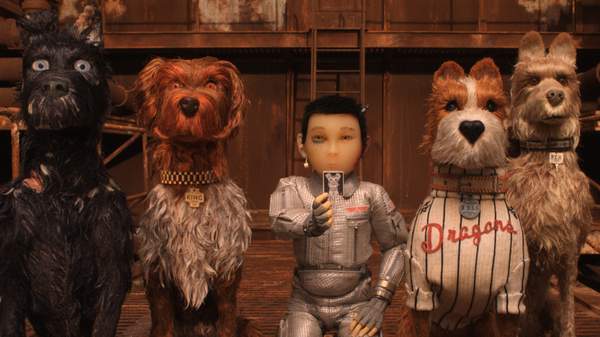Overview
A literal underdog tale about scrappy canines, a plucky orphan and a pooch-hating politician with an evil scheme, Isle of Dogs isn't just Wes Anderson's latest movie. Filled with heart, humour and witty dialogue, this doggone delight is the most Wes Anderson-esque movie the acclaimed filmmaker has ever made. Anyone who's seen any of his previous flicks knows exactly what that means, with the writer-director's work almost comprising its own genre. Think quirky quests about spirited characters following their own paths, set in worlds that cleverly expose humanity's desires and fears. Then there are his signature visuals, complete with symmetrical compositions that look like they belong in a gallery, and distinctive colour palettes anyone would love to plaster all over their own walls.
Constructed with the tail-wagging enthusiasm of man's best friend, all of these familiar components fall into place in the stop-motion animated wonder that is Isle of Dogs. And that's before Anderson trots out his other trademark: an A-list cast. For this walk around the block, he's joined by regular collaborators Bill Murray, Jeff Goldblum, Tilda Swinton, Bob Balaban, Harvey Keitel, Frances McDormand and Edward Norton, plus Anderson newcomers Bryan Cranston, Greta Gerwig, Scarlett Johansson, Liev Schreiber, Yoko Ono and Ken Watanabe. Throw in a story written with The Darjeeling Limited co-scribes Roman Coppola and Jason Schwartzman as well as The Grand Budapest Hotel actor Kunichi Nomura, and the end product couldn't feel more like an Anderson movie if it tried.
Set 20 years into the future, Isle of Dogs begins in the fictional Megasaki, as the Japanese city faces a difficult doggy dilemma. Its howling furballs are infected with dog flu and snout fever, sparking fears that the virus could soon spread to humans. Hailing from a long line of cat fanciers and hardly keen on pooches, Mayor Kobayashi (Nomura) decides to banish all canines to Trash Island. To demonstrate his commitment to the cause, he even exiles his own family pet: a short-haired oceanic speckle-eared sport hound by the name of Spots (voiced by Schreiber).
That's the setup. But Anderson's film really starts barking once the action moves to its offshore garbage pile — the actual isle of dogs. There, abandoned pooches fight for food, form packs and try to survive, as the mayor's orphaned 12-year-old nephew Atari (Koyu Rankin) discovers on his mission to find Spots. He's assisted in his task by Rex (Norton) and a ragtag gang of misfit mutts, including ex-baseball mascot Boss (Murray), one-time dog food spokesdog King (Balaban) and admitted gossip Duke (Goldblum). Gruff outsider Chief (Cranston) isn't thrilled about helping the boy they dub 'the little pilot', but he knows a lost puppy when he sees one.
With a former show dog (Johansson), an oracle pug (Swinton), robo-hounds, and a crusading American exchange student (Gerwig) also playing their parts, Isle of Dogs isn't short on antics. Anderson fills his narrative to the brim like an overflowing bowl of dog treats, spoiling viewers like he'd spoil his own animal companion. It's an approach that matches his lovingly detailed images, which surpass even Fantastic Mr Fox's animated splendour. Aesthetically, every second of the movie delivers something gorgeous and glorious — be it the lifelike puppetry of its central canines, a particularly meticulous sushi scene, or fond odes to Japanese filmmaking icons Akira Kurosawa and Yasujirō Ozu. Indeed, even if Isle of Dogs hadn't paired its eye-catching contents with smart, timely parallels — a power-hungry leader, discarded population and trash-filled land mass make it impossible to miss the film's political, social and environmental commentary — it'd still make an ace addition to Anderson's oeuvre.
That said, there's one area where the director shows his own limits. While Anderson is a seasoned master at combining exquisite visuals, lively voice work, an engaging story and a memorable message, a couple of his choices give pause (not paws) for thought. Isle of Dogs oozes affection for its location in every intricate element and never uses Japanese culture as decoration – but translating canine chatter into English while offering Japanese dialogue without subtitles threatens to marginalise the country the film is paying tribute to. Similarly problematic is Gerwig's character, who swoops in to help Megasaki's residents battle the mayor's nefarious plan, and sticks a little too closely to the white saviour trope in the process. Thankfully, she's never the main attraction, in what proves an otherwise charming tale about a determined boy, his undying love for his beloved pet, and a whole island of adorable dogs.
